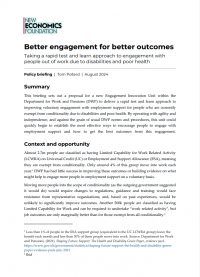Publications Better engagement for better outcomes Taking a rapid test and learn approach to engagement with people out of work due to disabilities and poor health By Tom Pollard 28 August 2024 Download the report This briefing sets out a proposal for a new Engagement Innovation Unit within the Department for Work and Pensions (DWP) to deliver a rapid test and learn approach to improving voluntary engagement with employment support for people who are currently exempt from
Topics:
New Economics Foundation considers the following as important:
This could be interesting, too:
Robert Vienneau writes Austrian Capital Theory And Triple-Switching In The Corn-Tractor Model
Mike Norman writes The Accursed Tariffs — NeilW
Mike Norman writes IRS has agreed to share migrants’ tax information with ICE
Mike Norman writes Trump’s “Liberation Day”: Another PR Gag, or Global Reorientation Turning Point? — Simplicius
Better engagement for better outcomes
Taking a rapid test and learn approach to engagement with people out of work due to disabilities and poor health
28 August 2024
This briefing sets out a proposal for a new Engagement Innovation Unit within the Department for Work and Pensions (DWP) to deliver a rapid test and learn approach to improving voluntary engagement with employment support for people who are currently exempt from conditionality due to disabilities and poor health. By operating with agility and independence, and against the grain of usual DWP norms and procedures, this unit could quickly begin to establish the most effective ways to encourage people to engage with employment support and how to get the best outcomes from this engagement.
Almost 2.7m people are classified as having Limited Capability for Work Related Activity (LCWRA) on Universal Credit (UC) or Employment and Support Allowance (ESA), meaning they are exempt from conditionality. Only around 4% of this group move into work each year. DWP has had little success in improving these outcomes or building evidence on what might help to engage more people in employment support on a voluntary basis.
Moving more people into the scope of conditionality (as the outgoing government suggested it would do) would require changes to regulations, guidance and training; would face resistance from representative organisations; and, based on past experiences, would be unlikely to significantly improve outcomes. Another 500k people are classified as having Limited Capability for Work and can be required to undertake “work related activity”, but job outcomes are only marginally better than for those exempt from all conditionality.
However, looking to increase voluntary engagement with employment support offers a path to more rapid and significant results. DWP could do much more to offer voluntary support those exempt from conditionality, but would need to overcome the distrust, and wariness of risking their benefit entitlement, that many in this group experience..
The new Labour team at DWP could quickly begin to improve voluntary engagement through a rapid and iterative test and learn approach. In the short-term this could quickly begin to demonstrate the potential to increase job outcomes for this group without resorting to conditionality. This could help to respond to potential Treasury pressure to proceed with plans to tighten eligibility for the Work Capability Assessment, which could otherwise be portrayed as the only viable path to managing rising costs.
In the medium term, this approach could inform and shape devolved delivery of employment support for this group, which may ultimately offer the most fertile opportunities for voluntary engagement. It could also be applied to a wider cohort subjected to limited conditionality, including parents of young children and carers.
In the longer-term it could improve practice and outcomes for everyone supported by DWP, bolstering the case for a focus on fostering engagement as the primary objective, only resorting to more prescriptive conditionality if the need for it is clearly demonstrated.
Topics Social security Work & pay




